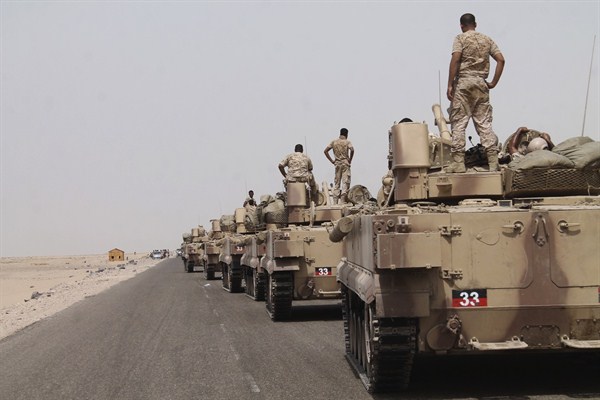Soon after the initial shock of Saudi Arabia’s military campaign in Yemen against Houthi rebels and military units loyal to former president Ali Abdullah Saleh had subsided, an important question arose. Would Riyadh, reorienting itself as an aggressive regional military force to be reckoned with—and no longer willing to ride on the coattails of the United States—put boots on the ground in Yemen?
The new Saudi monarch, King Salman, and his son Mohammed bin Salman, the young defense minister and deputy crown prince, signaled their willingness to send troops into Yemen—just not their own. But they had trouble enlisting help from their coalition partners. Egypt, on the hook to Riyadh for billions of dollars in financial support, nevertheless politely declined an invitation to lead a ground invasion this spring. It even invited Mohammed bin Salman to Cairo to explain the folly of a ground campaign in northern Yemen, according to several diplomatic sources. Pakistan, similarly indebted to Riyadh, followed suit. That limited the Saudi-led campaign to airstrikes and a naval blockade, while Riyadh and its partners—including its Gulf neighbors, Egypt and even Senegal—trained anti-Houthi fighters in Saudi Arabia. Although they shelled Houthi fighters across the Saudi-Yemen border, and largely leveled the Houthis’ home province of Saada, which borders the kingdom, the Saudis would not risk their own troops on the battlefield in Yemen, and neither would their allies.
Their caution wasn’t surprising, particularly among the Gulf states, which have well-funded but largely untested militaries. As they have in Yemen, Gulf states have largely limited their military activities around the region to airstrikes, whether in the U.S.-led coalition against the self-declared Islamic State in Syria and Iraq; NATO’s campaign in Libya to oust Moammar Gadhafi’s regime; or, more recently in Libya, attacks on Islamist militants there. But now the newly assertive United Arab Emirates—the only Gulf state to engage in those latter Libyan air strikes, with Egypt—has overturned long-held assumptions about the Gulf states’ willingness to risk the lives of their nationals in regional conflicts.

